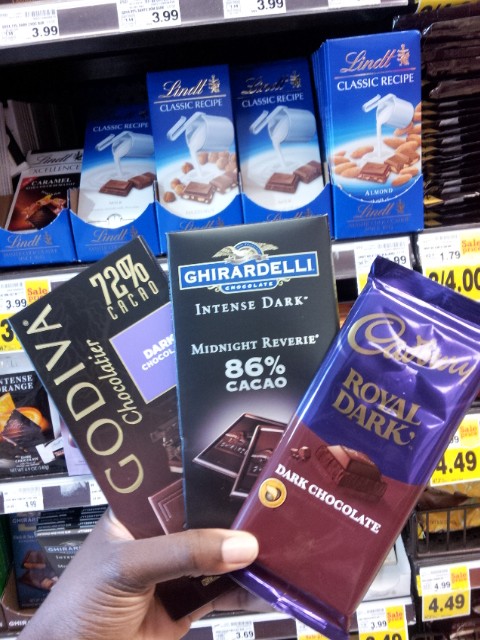Dark chocolate is distinguished from other chocolates for its rich bittersweet, intense flavor and originates from the harvested beans of Theobroma cacao trees; Theobroma cacao literally translates to “food of the gods”. Dark chocolate is made with a small amount of sugar, soy, vanilla flavoring, and is completely dairy-free. Its commercial cacao concentration ranges from the delightfully sweet 30 percent to extremely dark 80 percent bars, according to foodrepublic.com.
Although dark chocolate is typically used in baking, it has a variety of commercial uses and health properties. Studies have shown a correlation between its consumption and heart health, high blood antioxidant concentration, improved mood, and lower stress levels. According to WebMD.com, a study done by the Nestle Research Center in Lausanne showed that after eating 1.4 ounces of dark chocolate every day for two weeks, participant’s hormone stress levels were reduced and their metabolisms increased.
Similar studies in The Journal of the American Medical Association stated that “dark chocolate — not white chocolate — lowers blood pressure,” and the Nature scientific journal that “dark chocolate — but not milk chocolate or dark chocolate eaten with milk — is a potent antioxidant.” Cacao’s rich substances are rich in flavonoids which function as antioxidants within the body. Antioxidants help destroy free radicals which cause damage to cells, and are found in a foods like vegetables, fruits, tea, and red wine. Milk, however, can interfere with the absorption of antioxidants and reduce potential health benefits.
The bioactive compounds in dark chocolate also protect your skin from sun damage, according to authoritynutrition.com. The flavanols found naturally in cacao can improve blood flow to skin as well as increase its density and hydration. Studies have also linked high consumptions of flavanol with improved brain function. This is due to the artery-induced relaxation by flavanol and other organic compounds in chocolate like theobromine and caffeine that stimulate the brain. Those who are sensitive to caffeine, however, should eat chocolate moderately because of its high concentration of caffeine.
In addition, dark chocolate contains quite a number of minerals and vitamins that support your health. Specifically, its concentration of potassium and copper help reduce the risk of strokes and cardiovascular diseases. The iron in chocolate protects against anemia, and its magnesium concentration helps prevent type 2 diabetes, heart disease and high blood pressure.
Dark chocolate has very powerful health properties, especially when digested organically. A lot of commercial chocolate products are saturated in sugar, milk and other substances that negate the effects of natural cacao beans. When buying chocolate, look for organic dark chocolate with 60 percent cacao content or higher.
If you are interested in trying dark chocolate but are unsure about its mild semi-sweet taste, try it with a piece of fruit. A small portion of high quality dark chocolate is recommended because it is high in calories and fat, so consume sparingly. When choosing chocolates, remember darker is better.
Author: Arielle Tripp
Nommo Staff


